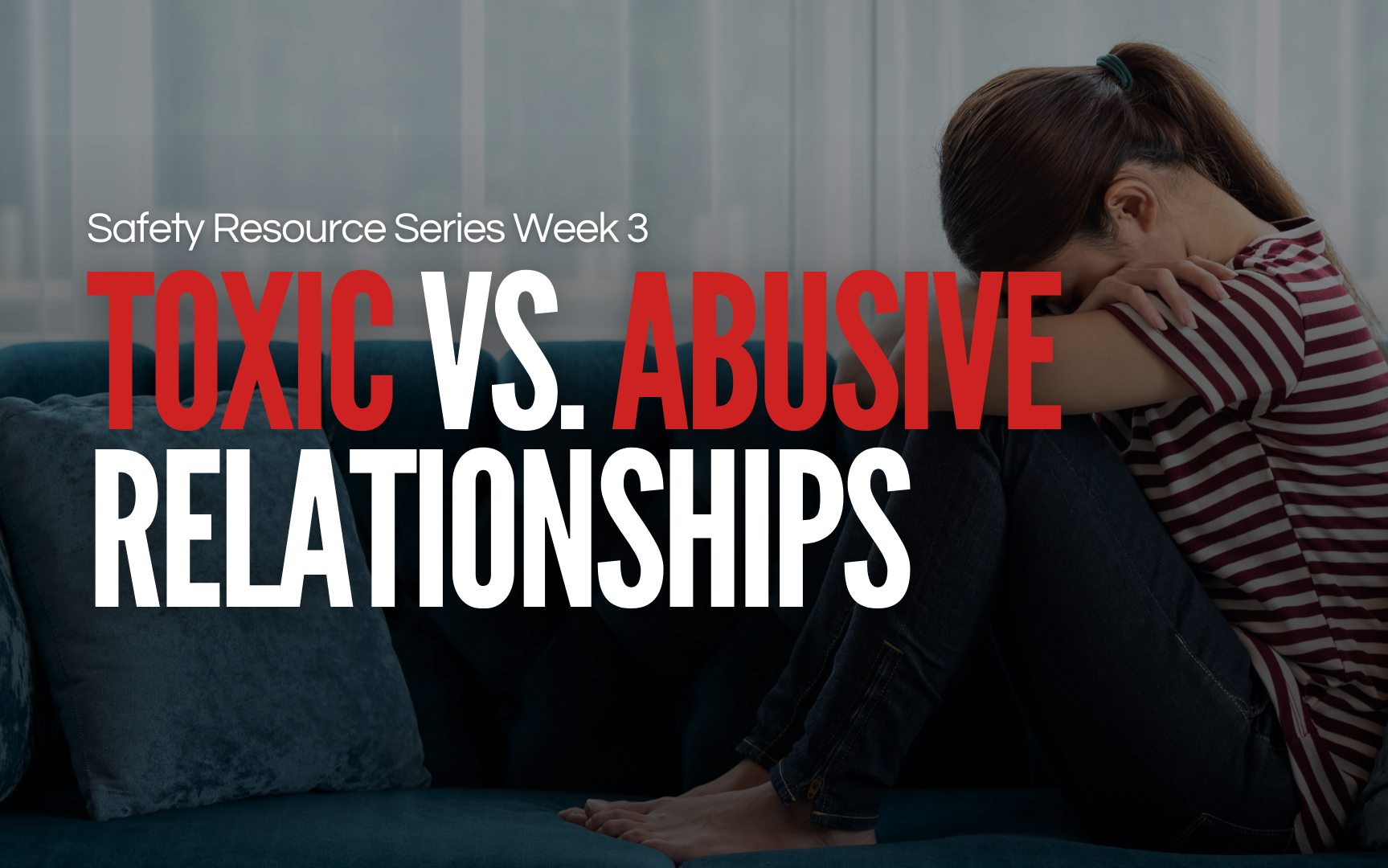
Toxic Relationships vs. Abusive Relationships
Safety Resource Blog Week Three
For today’s resource, we will be distinguishing the differences between toxic and abusive dynamics, which is a must when moving through the complexities of human connections.
While both terms are often used interchangeably, it’s key to recognize the subtle yet significant differences.
Toxic relationships pack in a bunch of negativities—think constant criticism, communication black holes, and emotional puppetry, all brewing up an unhealthy environment.
On the continuum, abusive relationships involve a more severe escalation, with many different forms such as physical or emotional harm, sexual abuse, control, and manipulation, creating a heightened sense of danger.
Nonetheless both environments can be unsafe, hostile and difficult to navigate.
Here are common types of abuse:
Physical Abuse
Physical abuse involves any form of violence or force inflicted upon a person, causing bodily harm or injury, such as hitting, punching, or kicking.
Sexual Abuse
Sexual abuse refers to any non-consensual sexual activity or behavior imposed on an individual, including rape, molestation, or coercion.
Online Abuse
Online abuse occurs when technology is used to harass, intimidate, or control someone, often through methods like cyberbullying, stalking, or sharing private information without consent.
Emotional and Verbal Abuse
Emotional and verbal abuse encompasses behaviours that harm a person’s self-esteem or emotional well-being, such as constant criticism, insults, manipulation, or threats.
Financial Abuse
Financial abuse involves controlling or exploiting someone’s financial resources, limiting their access to money or assets, or using money as a means of power and control within a relationship.
Stalking
Stalking involves repeated and unwanted attention, harassment, or surveillance directed towards a person, causing fear or distress, either in person or through methods like phone calls, texts, or social media.
It’s important to note that abuse can manifest in various ways, and the severity may vary. For additional information on abuse or to seek support, please visit bwss.org.
Effects of Toxic Relationships
The impacts of toxic relationships go way beyond just simply messing with your emotions; but also affecting mental health, self-worth, and overall well-being—persisting both during the relationship and after its termination.
We need to challenging the idea that a toxic relationship without physical violence is less serious. The impact of verbal, emotional, and psychological abuse can be just as significant as the more visible forms.
Survivors of toxic relationships often face various negative consequences. Let’s take a look at what survivors of toxic relationships may encounter in the long term.
Impaired Mental Health:
- Persistent stress and anxiety.
- Increased risk of depression.
- Chronic emotional distress and instability.
Low Self-Esteem:
- Continuous criticism erodes self-worth.
- Diminished confidence and self-belief.
- Difficulty in trusting oneself and others.
Isolation and Loneliness:
- Alienation from support networks.
- Limited social interactions due to toxic dynamics.
- Prolonged feelings of loneliness and isolation.
Physical Health Consequences:
- Adverse impact on immune system functioning.
- Increased susceptibility to stress-related illnesses.
- Chronic health conditions due to prolonged stress.
Impaired Decision-Making Skills:
- Difficulty making choices independently.
- Fear of consequences and hesitation in decision-making.
- Reliance on external validation for choices.
Emotional Detachment:
- Fear of vulnerability and emotional closeness.
- Emotional numbness as a coping mechanism.
- Struggles with forming deep emotional connections.
Trust Issues:
- Difficulty trusting others due to past betrayals.
- Fear of being deceived or manipulated in future relationships.
- Guarded and cautious approach to forming new connections.
Reduced Life Satisfaction:
- Diminished overall happiness and life fulfillment.
- Inability to derive joy from personal and professional accomplishments.
- Persistent dissatisfaction with various aspects of life.
Post-Traumatic Stress Symptoms:
- Intrusive memories and flashbacks to traumatic events.
- Hypervigilance and heightened startle response.
- Difficulty concentrating and sleep disturbances.
Financial Implications:
- Economic instability due to financial control in the toxic relationship.
- Difficulty managing finances independently.
- Long-term impact on career and financial well-being.
Impact on Personal Development:
- Stunted personal growth and development.
- Hesitation in pursuing goals and aspirations.
- Struggles in building a positive self-image.
Recognizing and tackling these long-term effects is key for survivors aiming to shake off the negative impact of a toxic relationship and kickstart their journey toward healing and recovery.
Getting support from friends, family, or mental health experts can be the supports you need to make a change.
REMEMBER!
Any forms of Abuse are never your fault. Talk to someone you trust and make a safety plan.
Seeking Help
When you’re entangled in a toxic relationship or suspect someone close to you might be, taking a step to seek help is necessary for finding a resolution.
We understand that it might feel quite daunting to take that first step, but keep in mind, you’re not alone, and there might be local resources waiting to support you.
Understanding that every survivor’s journey is unique and the road to intervention differs for each person is key. Seeking help can mean various things, like opening up to a trusted friend, setting boundaries, walking away from the relationship, taking a break, or creating a safety plan.
The key is recognizing that there are many paths to steer you toward a healthier and safer environment.
You are not alone.
If you or someone you love is in need of support, please contact the Battered Women Support Services Crisis Line:
Call toll-free: 1-855-687-1868
Metro Vancouver: 604-687-1867




